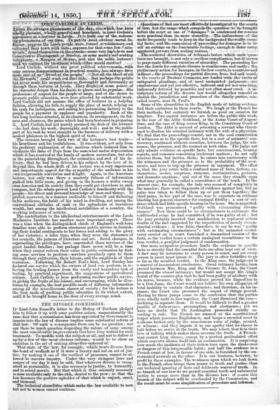r e
ATIIPICasants who Fakefol-aud *bind
of day, onetwitiela ,.has- been fele .10flee as a lecturer in. Leeds. ,1114,#411Y one of the redeem.; haenemena of our time. To putrite-omest obvious moral in- nep,1 Appose the Le da,Reople wore ,illTned revolutionary_ and YR VIP town:with Wiks soePosesteP thet some-few." ads- IpplSe 1 vea glue streets,,efilEee very ihigliobora and tagenf-txtanley, orPOOPAe i9tepelylsalf- id g i erquia,etelijempetoend, elee the noble ..leeturee; the tiVatillemt.x1341either,efonld zogiveR e, without say great political achievement% . with te.inwitewPrenttioel eetfultiehinia beltways, . been i9i.trI"Plendigf44,peolpleo f`f Zietifattio,bieod of all VArds.. ,could washent Oat But perhaps the public finen.,r anade,his acquaintannise thoroughly and. favourably as -li these lectures at Leeds.. They displayed some points of his Character deeper than his desire to please and be.,popular. His professions, of reaped for the people at large, and of the desire to promote public education, were here attested by substantial work. Lord Carlisle did not assume the office of lecturer in a holyday fashion, allowing his title to.supply the place of merit, relying on his rank for indulgence, and selling his patronizing flattery to the people for a. payment in applause and popularity. Each of the two long lectures attested, in its clearness, its arrangement, its ful- ness and closeness, the pains which had been bestowed in preparing it. Lord Carlisle had not merely assumed the desk of the lecturer —he had done his work, thoroughly and well ; and in the public part of his task he went straight to the business of delivery with a. modest plainness in the highest spirit of taste,
The occasion brought forth two of the lecturer's best traits— his heartiness and his truthfulness. It was evident, not only from his prefatory explanation of the motives which induced-him to vindicate the fame of Pope from the somewhat undue depreciation which it has received at the hands-of modern naturalism, but also in the painstaking throughout, the animation and zest of his de- livery, that he, had been driven to his subject by the love of it. Beyond this, the whole drift of his lecture was emery ingenuous and importunate appeal for. thellympathy of the audience in his own irrepressible conviction and delight. Again, in the American lecture, not only was there a masterly fulness of information. packed into little room, and giving to the hearers a wider sweep over America and its -society than they could get elsewhere in such ompass, but the whole proved Lord Carlisle's familiarity with the ple—his direct and personal knowledge of men and things. It proved, moreover, in a manner creditable to himself and flattering to his audience, the habit of his mind in dwelling,not among the conventional altitudes of rank or the splendours of luxurious wealth, but among the intellectual,notabilities of a country, the working influences of society.
The contribution to the intellectual entertainments of the Leeds Mechanics Institute has another more important aspect. There was a time when the .distinguished chiefs of R gland's welbborn families were able to perform-strenuous public service in furnish- ing their feudal contingents to her forces and adding to the glory of her victories ; a later time, when they were the statesmen of her. councils, the patrons of literature and art. Social changes, in superseding, the privileges, have • superseded those services of the great landed .families ; but. perhaps there never will be a time when they cannot redeem their value in public estimation by find- ing some services to perform—services peculiarly open to them through their cultivation, their leisure, and the amplitude of their resources. Following Sir- Robert Peers hint, Lord Stanley has declared one service which the owners of land can perform, in re- lieving the trading.farmer from the costly and hazardous task of testing, by practical experiment, the suggestions of agricultural science. Lord Carlisle is here performing another public service, in.givingthe fruits of his leisure,.and,encouraging, while he illus- trates by example, the best possible;mode of diffusing information among all the miscellaneous classes of society; for the lecture is the best mode of pushing public education to its widest extent, until it be brought home to the door of every average mind.


























 Previous page
Previous page